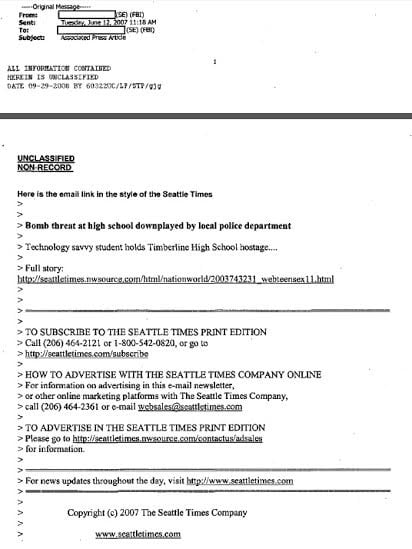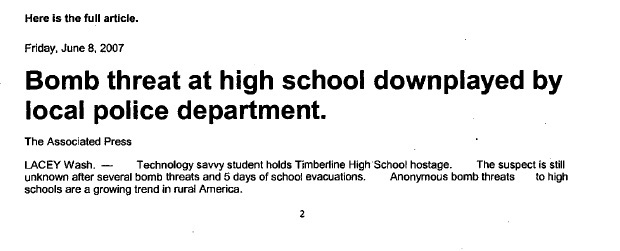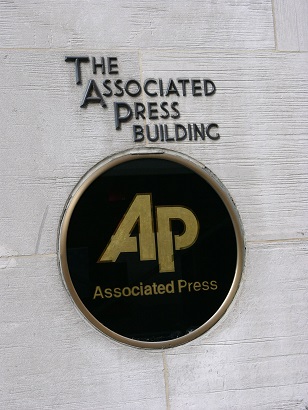Honest, paywall-free news is rare. Please support our boldly independent journalism with a donation of any size.
The FBI disrespected and violated the First Amendment, freedom of the press and trademark law when it used the Associated Press trademark to ensnare a suspect. Congress mirrors the FBI’s lack of respect for the First Amendment by displaying little concern about the FBI posing as a legitimate media outlet, while the Associated Press itself, one of the beneficiaries of the First Amendment, looks the other way.
The FBI was caught infringing the trademarked name of the Associated Press to target a suspect. Or, as AP likes to say, the FBI was caught violating AP’s name when the FBI created a fake news story under the Associated Press byline. Various news sources and blogs have expressed outrage over the FBI’s actions in this matter. But there seems to be little real action to back up that outrage.
 FBI emails in EFF documents, p. 61-62.Documents obtained by Electronic Frontier Foundation (EFF) show FBI emails with a proposed message containing a link to a fake Seattle Times website showing a fake news story using the trademarked Associated Press byline. And in fact, the FBI sent a message to a suspect’s MySpace account with a link to the fake news story. Once the suspect clicked on the link, embedded code was downloaded to his computer, and the FBI was able to geolocate the suspect based on the code. According to the FBI, a 15-year-old student who had been sending bomb threats to a high school in 2007 was caught and prosecuted using this technique.
FBI emails in EFF documents, p. 61-62.Documents obtained by Electronic Frontier Foundation (EFF) show FBI emails with a proposed message containing a link to a fake Seattle Times website showing a fake news story using the trademarked Associated Press byline. And in fact, the FBI sent a message to a suspect’s MySpace account with a link to the fake news story. Once the suspect clicked on the link, embedded code was downloaded to his computer, and the FBI was able to geolocate the suspect based on the code. According to the FBI, a 15-year-old student who had been sending bomb threats to a high school in 2007 was caught and prosecuted using this technique.
First, as a threshold issue, if the FBI had the suspect’s MySpace account, it had no need to use the names of The Seattle Times or the Associated Press. The FBI could have sent many other types of messages to entice the suspect to click on a link (for example, a link to a free video game). There was no need to even think about infringing the names of respected news sources to ensnare a suspect. That is the first indication of the FBI’s complete lack of respect for freedom of the press guaranteed by the First Amendment.
Turning to the trademark issues, the FBI emails provide the text of a message that it proposed to send to the suspect. These emails show that the proposed message used “www.seattletimes.com” and actually claimed copyright protection for The Seattle Times name.
The EFF documents also provide the text the FBI proposed to use in the fake article, and show use of the Associated Press trademark.
 EFF documents, p. 62.
EFF documents, p. 62.
Despite the documentary evidence, the FBI now claims that “at no time . . . did we reference The Seattle Times or provide any connection” to the newspaper. Special Agent in Charge Frank Montoya Jr. said that the use of The Seattle Times’ name was only a “suggestion.” The newspaper appears to be mollified, with its editor, Kathy Best, stating: “We’re pleased to hear the FBI did not use The Seattle Times to further its investigation.” She seems to have some doubts about the truth of the FBI’s statements, however, as she also said, “But we wish we had gotten that definitive ‘no’ from the FBI – instead of a defense of the tactic – Monday after providing the agency with internal FBI documents showing a mocked-up phony Seattle Times email and Web page.”
Apparently, there is no plausible deniability for the FBI’s misuse of the Associated Press name, and the FBI has admitted to using a fake AP story to catch the suspect. But the Associated Press seems remarkably unperturbed by this, and has only “objected” to the FBI’s use of its trademark.
Our elected leaders don’t seem to care too much that the FBI is impersonating the press. Senate Judiciary Committee Chairman Patrick Leahy sent a letter to Attorney General Eric Holder, expressing “concern” over the FBI’s tactics, and thereby demonstrating exactly how important this issue is to Congress.
The Associated Press displayed a similar level of concern about the FBI’s infringement of its trademark. “Associated Press” is a federally registered trademark, and is also covered by other intellectual property rights. The FBI admits to using the trademark in a way that is likely to cause confusion (one of the tests of trademark infringement). Yet, AP’s general counsel seems unconcerned about the trademark infringement, saying only that the FBI “misappropriated” the name. There has been no threat of litigation over the FBI’s infringement of AP’s trademark, although AP has not been shy about protecting its intellectual property rights in the past.
Freedom of the press is one of the hallmarks of American values, found in the First Amendment to the US Constitution. Freedom of speech and press are often cited as reasons the United States needs to engage in military operations across the world – to provide others the same freedoms enjoyed here in the United States. However, here, the FBI shows a complete lack of respect for the First Amendment. Congress mirrors the FBI’s lack of respect, and can muster a letter from one senator expressing “concern” only. The Associated Press itself, one of the beneficiaries of the First Amendment, apparently is going to look the other way and allow the FBI to trample the First Amendment and its trademark rights. These events show the true state of freedom of the press in the United States today.
A terrifying moment. We appeal for your support.
In the last weeks, we have witnessed an authoritarian assault on communities in Minnesota and across the nation.
The need for truthful, grassroots reporting is urgent at this cataclysmic historical moment. Yet, Trump-aligned billionaires and other allies have taken over many legacy media outlets — the culmination of a decades-long campaign to place control of the narrative into the hands of the political right.
We refuse to let Trump’s blatant propaganda machine go unchecked. Untethered to corporate ownership or advertisers, Truthout remains fearless in our reporting and our determination to use journalism as a tool for justice.
But we need your help just to fund our basic expenses. Over 80 percent of Truthout’s funding comes from small individual donations from our community of readers, and over a third of our total budget is supported by recurring monthly donors.
Truthout has launched a fundraiser, and we have a goal to add 231 new monthly donors in the next 48 hours. Whether you can make a small monthly donation or a larger one-time gift, Truthout only works with your support.
